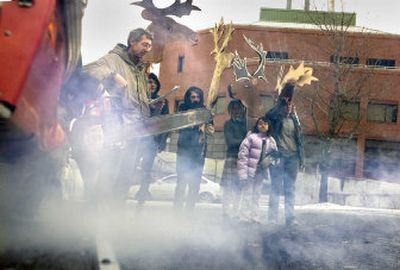Caribou numbers desperate

A recent proposal by British Columbia to abandon recovery efforts for the most imperiled mountain caribou herds, including the last herd roaming Idaho’s border with the province, has prompted widespread outrage in both Canada and the United States, said Pat Field, a management consultant with the province’s Species at Risk Coordination Office.
But Field said this “rage factor” could actually prompt politicians to take action. Unless tough decisions are made quickly, “We are going to be the generation of the lost,” he said.
Field offered his comments Tuesday in Spokane at a meeting of top caribou scientists and activists. The group has been meeting for years, and each year the message has been about the same: Caribou are disappearing fast.
This year there is a growing sense of desperation because of British Columbia’s talk of abandoning recovery efforts for the southernmost herds and focusing work on healthier populations farther to the north, said Rein Attemann, a caribou activist with the Spokane-based Lands Council. Five different options were spelled out in the recent proposal, including a plan that would attempt to recover all 12 herds of mountain caribou in the province. Attemann said caribou activists were “shocked” that abandonment is even being considered – with only two or three mountain caribou living in the United States, the future of the animals is entirely in Canada’s hands.
“If our only herd goes extinct, we have Canada to blame,” Attemann said.
As scientists shared their latest research at Washington State University’s Riverpoint campus, Attemann and about a dozen others held a protest rally outside, with a roaring chain saw and a pair of rumbling snowmobiles as props. “There has to be enough outcry for British Columbia to take action,” Attemann said, his voice barely audible over the deafening machinery.
The data on snowmobiling’s impact on caribou is “really new and weak,” said Rob Serrouya, a wildlife researcher from British Columbia, but research in two popular snowmobiling areas near Revelstoke, B.C., shows caribou sightings were cut by more than half after 1998, when more powerful machines allowed riders to penetrate into previously quiet mountain basins.
Environmental groups in the United States recently filed a lawsuit hoping to curtail snowmobile use in much of the backcountry near Priest Lake, Idaho. The fight has become bitter, with tourism and business advocates worrying a victory could kick the legs out from under the region’s winter economy. Mark Sprengel, with the Selkirk Conservation Alliance, said most snowmobile riders stay out of caribou habitat, but it takes only a few to scare animals from vast tracts of backcountry.
“The problem is growing exponentially worse,” Sprengel said. “If we’re not willing to voluntarily constrain our behavior, we’re going to lose these animals.”
In British Columbia, backcountry skiing operators have started voluntarily staying away from slopes where caribou are spotted, said wildlife biologist and consultant Dennis Hamilton. South of Nelson, B.C., snowmobile clubs this year have voluntarily agreed to stop riding in prime habitat areas. The province has also adjusted hunting seasons to try and control predator numbers in caribou habitat – wolf and cougar predation is the leading direct cause of caribou death, scientists say.
Because of those changes, and despite talk of abandoning the southern herds, the longterm outlook for Canada’s caribou is brighter now than it has been in the last decade, said Guy Woods, a wildlife biologist with the province’s ministry of environment. Woods has been studying caribou for more than 25 years. “I’m optimistic,” he said.
Rather than abandoning the southern herds, Canadian scientists would like to augment them with transplants from healthier populations farther north. But that won’t happen without approval from Indian tribes, Field said. Many tribes have depended on caribou for thousands of years and they consider the animals “part of their family,” Field said. The tribes are not willing to have their caribou transplanted unless assurances can be given the animals will have a safe, quiet home and a steady source of lichen in old growth temperate rainforest.
More will be known in spring, when the province moves forward on selecting a longterm caribou recovery plan.
“The province has a major responsibility globally to do something about mountain caribou,” Field said.